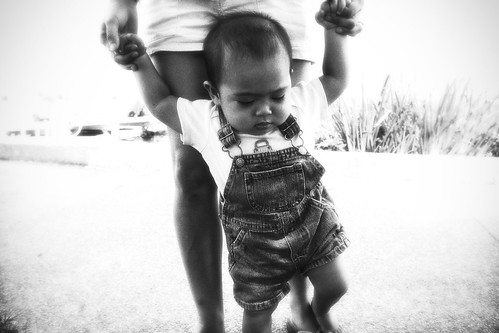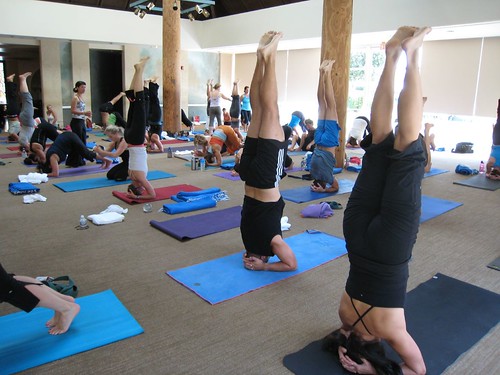 |
| Photo credit: Akuppa John Wigham./ Flickr Creative Commons |
I was the last of five students scheduled to teach yesterday. Just as the second class was winding down and we were moving into Savasana, loud music began blaring into our room from outside. After class, we looked outside and discovered that the car wash across the street had been converted into some kind of event stage for the Art Around Adams festival. Large speakers were pointed directly towards the studio window. We decided to move to the main studio, a much larger and less intimate space but better insulated for sound.
Two more classes went by without incident, and it was my turn to teach. I set up my room, playing some mood-setting music on my iPod. Everyone was tired but ready to push through with class. Then, just as I was beginning to teach, loud drumming started right outside the studio. I was completely fazed. Sound easily affects my concentration, with calming music assisting me and drum beats extremely distracting. Nevertheless, I'd been preparing for this moment and I was ready to teach. I began my class, doing my best to focus and create a calming atmosphere. I walked around, breathing a loud ujjayi breath. I tried turning my music off, but then the drums seemed at odds with what I was doing. I tried turning it up, but there was no competing. I ended up settling for my music fairly softly and the drums beating over the top of it all.
In spite of all this, the class went really well. It's always challenging doing something new, and stressful to take any exam, but I was really happy with how things went. At some point, the drums stopped, so my quiet meditative music was the only sound for Savasana and I was able to go around and do some nice adjustments and spread the lovely scent of lavender around the room.
However, there was still one last lesson to be learned. It wasn't until a couple of people suggested that I could have simply turned my music off and taught the class to the beat of the drums that I realized I had totally missed the gift I had been sent. For me, the drums were a distraction and "ruining" the mood I had chosen to set for the class, but for the students doing the class, the drums were an invigorating force at the end of a long and tiring day. I had completely missed that potential energy. All that planning and visualization was helpful, but in the end, there I was repeating an old pattern: clinging stubbornly to my plans, my version of how things were "supposed to be" - and fighting against the inexorable rhythm of life.
This class - my last class as a trainee teacher and my first class as a professional - taught me something I never expected. As I taught my first class in the role of a teacher, I also found myself in the role of a student, repeating an important lesson about life. I am not in control. Life has its own rhythms, and sometimes dancing to your own drummer is not the way to go if your inner drummer is in conflict with the rhythms around you.
Ironically, this lesson was already encapsulated in my class and it was I, the teacher, who needed to hear it. The class theme was "gratitude", and I ended with a quote from Melody Beattie:
"Gratitude unlocks the fullness of life. It turns what we have into enough, and more. It turns denial into acceptance, chaos to order, confusion to clarity. It can turn a meal into a feast, a house into a home, a stranger into a friend."
Gratitude unlocks the fullness of life. It turns what we have into enough, and more. It turns denial into acceptance, chaos to order, confusion to clarity.
What I had was live drumming right outside the studio, and I had forgotten to be grateful! What I had was enough and more. My gratitude in those first few moments of class could have turned "denial into acceptance, chaos to order, confusion to clarity." Instead, I suffered through fear and frustration. Now, as I work to let go of the story of how things happened or how things could have happened, I am realizing that not clinging to the past does not mean we fail to grasp its lessons. I hope that I will be able to carry this lesson with me into my work as a yoga teacher.
I don't think it's a coincidence that this was exactly the lesson I needed to grow as a person, a yogi, a teacher. I am very grateful for those drummers now.






